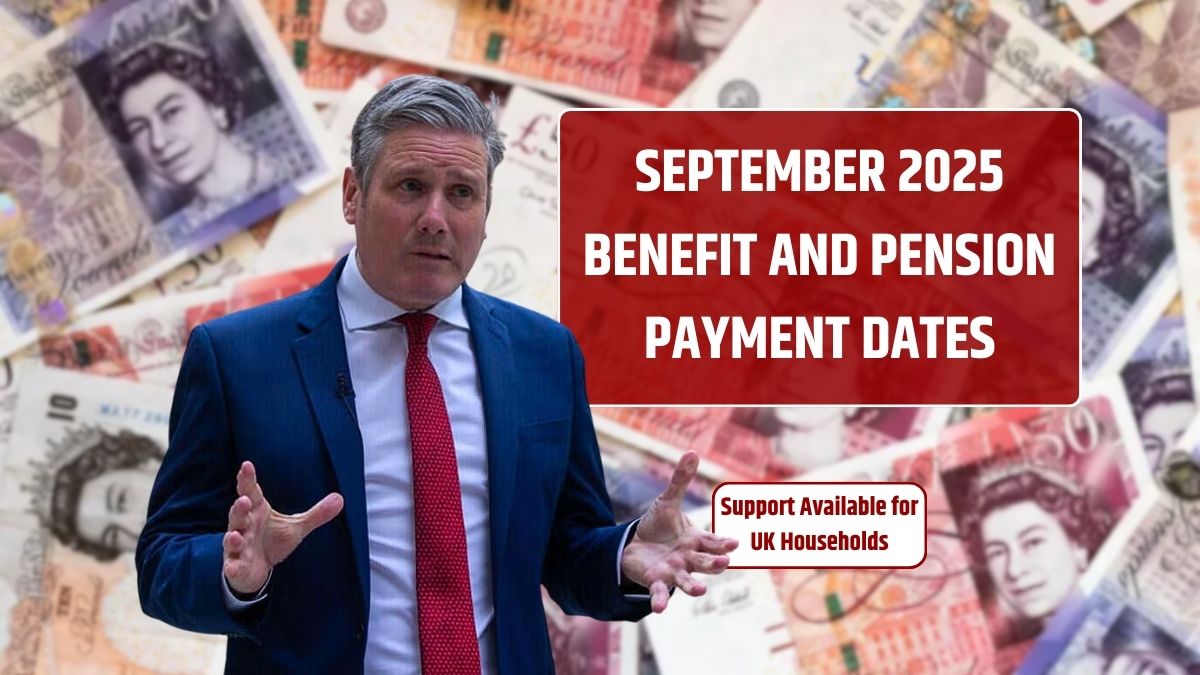As summer winds down and schools prepare to reopen, many families in the UK are hoping for a break from recent financial strain. But for millions, the high cost of living remains a daily challenge—despite inflation falling back to more manageable levels.
Research shows that essential costs like food, energy, and rent remain high, with little relief in sight. More than 7 million adults in the UK reported food insecurity earlier this year, and energy debt has nearly doubled over five years. As budgets remain stretched, knowing what financial support is available can make a big difference.
Here’s everything you need to know about benefit and pension payments for September 2025, plus other cost-of-living support you may be entitled to.
Table of Contents
Payments
There are no bank holidays in September, so all benefits and pension payments will be made on their usual scheduled dates.
The following benefits are due for regular payment this month:
- Universal Credit
- State Pension
- Pension Credit
- Child Benefit
- Disability Living Allowance (DLA)
- Personal Independence Payment (PIP)
- Attendance Allowance
- Carer’s Allowance
- Employment Support Allowance (ESA)
- Income Support
- Jobseeker’s Allowance
If you’re receiving a “legacy” benefit such as tax credits, housing benefit, or income support, you should be aware that the Department for Work and Pensions is aiming to complete all transfers to Universal Credit by January 2026. Letters informing recipients of the transition are being sent out.
Pension
The basic state pension is paid every four weeks, and your specific payday depends on the last two digits of your National Insurance number:
| NI Number Ending | Payment Day |
|---|---|
| 00 to 19 | Monday |
| 20 to 39 | Tuesday |
| 40 to 59 | Wednesday |
| 60 to 79 | Thursday |
| 80 to 99 | Friday |
Pensioners received a 4.1% rise in their payments this year under the triple lock, adding up to £472 extra annually.
Increases
Benefit rates were raised by 1.7% in April 2025, matching inflation measured in September 2024. This increase applied to all working-age benefits including Universal Credit, PIP, and ESA.
From April 2026, Universal Credit payments will receive above-inflation increases through Labour’s new welfare bill. These increases will continue annually until 2029, with the first being at least 2.3%. However, the health-related element for new Universal Credit claimants will drop from £105 to £50 per month and stay frozen until 2029. If you’re eligible for this element, it’s advisable to apply before the change kicks in.
Loans
Budgeting Advance
Universal Credit recipients can apply for a budgeting advance loan to help with emergency costs. These are interest-free and repaid over time through benefit deductions.
| Claim Type | Maximum Advance |
|---|---|
| Single person | £348 |
| Couple | £464 |
| With children | £812 |
From April 2025, a new cap limits how much can be deducted from Universal Credit to repay debts. The maximum deduction will drop to 15% of the standard allowance, down from 25%.
Housing
If you’re struggling with rent, you may be eligible for a DHP. This support is for people receiving Housing Benefit or the housing element of Universal Credit. It can cover rent shortfalls, deposits, or moving costs. You’ll need to apply through your local council.
Household Support Fund (HSF)
The HSF offers one-time support such as cash grants, help with bills, and essential household goods. Funded by central government, this scheme is administered locally by councils and is set to run until March 2026. Apply through your local authority’s website.
Other Support
You could qualify for a discount of up to 100% on your council tax bill if you’re on a low income or claiming benefits. Each council runs its own scheme, so eligibility varies. Check through the government website to apply.
Energy Bills
Several energy companies like British Gas, Octopus, E.ON, and EDF offer hardship funds. If you’re falling behind on payments, contact your provider directly to see what support they can offer.
Energy Price Cap
Ofgem’s cap dropped from £1,849 to £1,720 for the period July to September 2025. This is a 7% drop, offering slight relief. The new cap for October to December will be announced at the end of August.
Free Childcare
Starting 1 September, working parents are now entitled to 15 hours of free childcare for children aged nine months and up. By September 2025, all children under five will be eligible for up to 30 free hours. You must apply online and re-confirm eligibility every three months.
Charitable Grants
Charities offer one-time grants based on specific circumstances, such as being a carer, student, or unemployed. Turn2us offers an online tool to help you find grants you may qualify for.
Cost of Living Payment
There are no new cost of living payments confirmed for 2025. The final round of support under the previous scheme was paid between 6 and 22 February 2024.
Mental Health
Financial stress takes a toll. Here are some resources:
- Samaritans: Call 116 123 for 24/7 support
- Mind: Mental health line: 0300 102 1234, Welfare benefits line: 0300 222 5782
- Scope: Disability support forums and resources
- NHS England: Offers online mental health services for those in need
Every bit of help matters, and many families aren’t claiming what they’re entitled to. Tools like benefit calculators from Policy in Practice or Turn2us can help you find support you might be missing.


